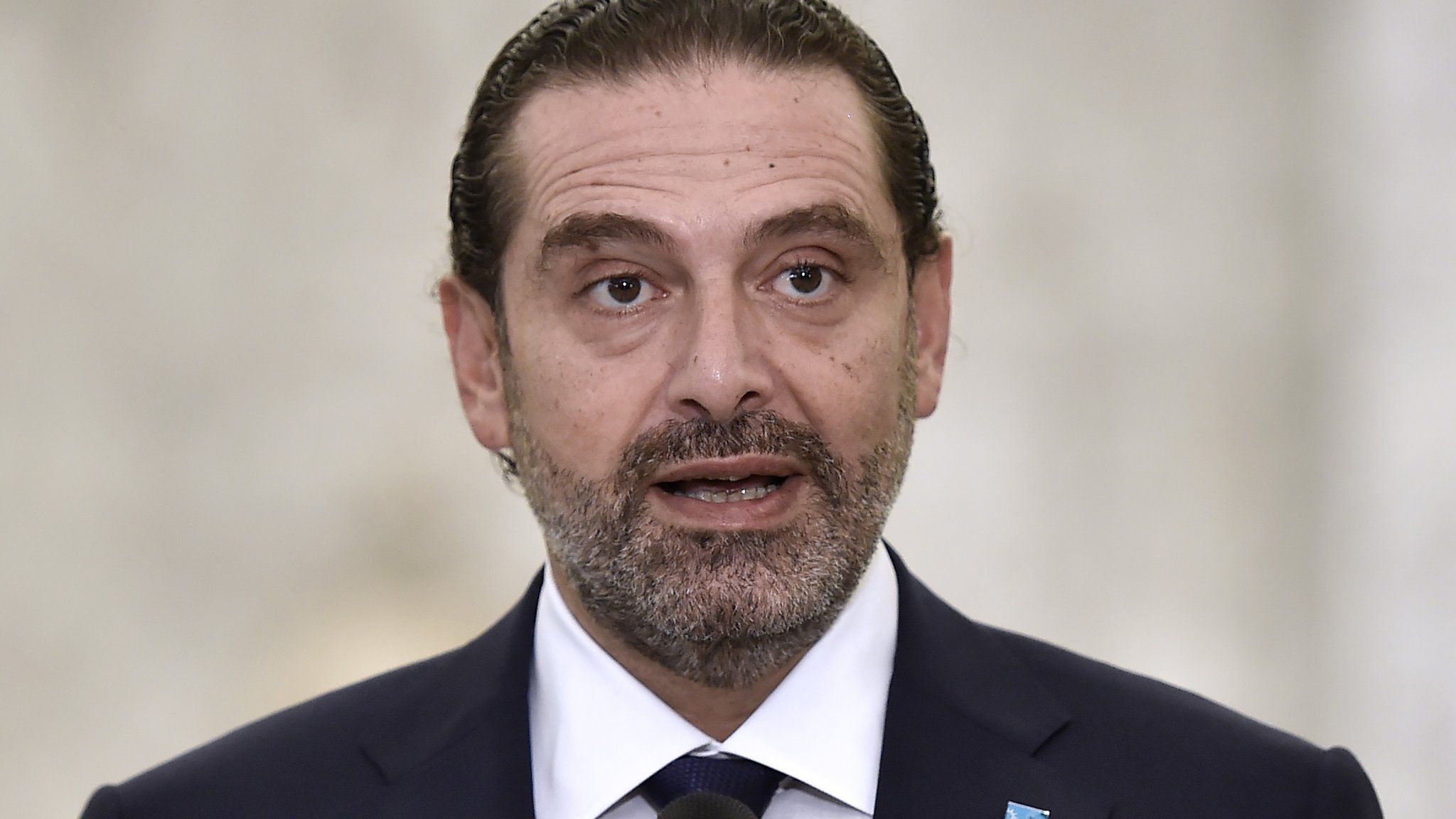Lebanon crisis: Saad Hariri returns as PM a year after protests
- Published

Lebanon's political parties have chosen Saad Hariri to be prime minister, a year after he stepped down in the face of mass anti-government protests.
Mr Hariri said he would form a cabinet of experts, who will have to deal with the country's deep economic crisis.
Protesters began demanding a complete overhaul of the political system last October, as the economy began to stall.
Since then, Lebanon's problems have been compounded by the coronavirus pandemic and the explosion in Beirut.
The devastating blast in August, which many blamed on government negligence, prompted the resignation of Mr Hariri's successor, Hassan Diab.
The man nominated to replace him, Mustapha Adib, quit last month after failing to win enough support for his non-partisan cabinet line-up.
That dealt a blow to a French initiative that requires Lebanon's politicians to implement urgent reforms and tackle corruption in return for billions of dollars of international aid.
Speaking to reporters on Thursday, Mr Hariri pledged to quickly form a government "with a mission to enact the economic and financial reforms" set out in the French plan.
"I tell the Lebanese who are suffering from hardships to the point of despair that I am determined to work to stop the collapse that is threatening our economy, our society and security," he added.
President Michel Aoun named him prime minister-designate on Thursday after he secured the support of 65 of the 128 members of parliament.
The BBC's Lina Sinjab reports from Beirut: "A year of rising and fading hopes"
The 50-year-old was backed by his own Sunni Muslim-led Future Movement, the Shia Muslim Amal party of Speaker Nabih Berri, and Druze leader Walid Jumblatt's Progressive Socialist Party.
The Shia Hezbollah movement, the most powerful political and military group in Lebanon, declined to nominate a candidate but said it would "maintain the positive climate".
Lawmakers from the two main Christian blocs - the Free Patriotic Movement, led by Mr Aoun's son-in-law Gebran Bassil, and the Lebanese Forces party of Samir Geagea - also abstained.
The BBC's Martin Patience in Beirut says that for Lebanon's politicians it appears to be business as usual. If Mr Hariri manages to form a government - and that is far from being a given - he will be serving as Lebanon's prime minister for his third time.
But, our correspondent adds, the challenges he faces are enormous, and the international community has repeatedly said it will not provide assistance unless the country's leaders fundamentally reform the system - which they show no sign of doing.
Why is Lebanon in crisis?
During Mr Hariri's previous term in office, Lebanon's economy began to collapse.
The country, which is one of the most indebted in the world, saw growth fall to zero and its pegged currency lose value on the black market as a result of a shortage of US dollars.
Protesters in Beirut in October 2019: 'I feel proud to be Lebanese'
Unemployment and poverty were also rising, and people were getting increasingly angry about the government's failure to provide even basic services.
The protests that eventually forced Mr Hariri to resign erupted after his cabinet proposed a tax on voice calls via messaging services such as WhatsApp to help raise revenue.
The unrest rapidly turned into a nationwide revolt against a political elite that many Lebanese have long accused of corruption, waste, mismanagement and negligence.
Why Lebanon finds it difficult to change
A key demand of the protesters was a government led by independent technocrats.
Power in Lebanon is largely based on sectarian interests. Political appointments and many jobs depend on belonging to one of the country's 18 officially recognised religious communities - a situation that has led to patronage and cronyism.
The National Pact of 1943 declares that the president must be a Christian, the prime minister a Sunni Muslim, and the speaker of parliament a Shia Muslim.
What led to Mr Hariri's return?
His resignation a year ago was followed by months of deadlock, as rival politicians argued over who to choose as his replacement as the protests and economic turmoil continued.
Hezbollah and its allies, who control a majority of the seats in parliament, eventually pushed through the appointment of Mr Diab.
Lebanon defaulted on its foreign debt for the first time in its history in March, not long after the country reported its first case of the new coronavirus.
The pandemic curbed the protests but made the economic situation much worse and exposed the inadequacies of Lebanon's social welfare system.
Many business were forced to lay off staff or furlough them without pay; the Lebanese pound's black-market value plunged; banks tightened capital controls; and many families were unable to buy even basic necessities as prices soared.
Starting with the epicentre, we follow how the 4 August blast ripped through the city, bringing life to a halt
Lebanon was beginning to recover when a fire triggered the detonation of 2,750 tonnes of ammonium nitrate that had been stored unsafely at Beirut's port.
The massive explosion killed almost 200 people, injured 6,000 others, and caused as much as $4.6bn (£3.6bn) of physical damage and $3.5bn of economic damage.
The blast reignited the anger at Lebanon's political leaders and led to fresh protests. Mr Diab resigned, blaming "a system of corruption... deeply-rooted in all the functions of the state".
- Published17 October 2020
- Published11 September 2020
- Published17 October 2020